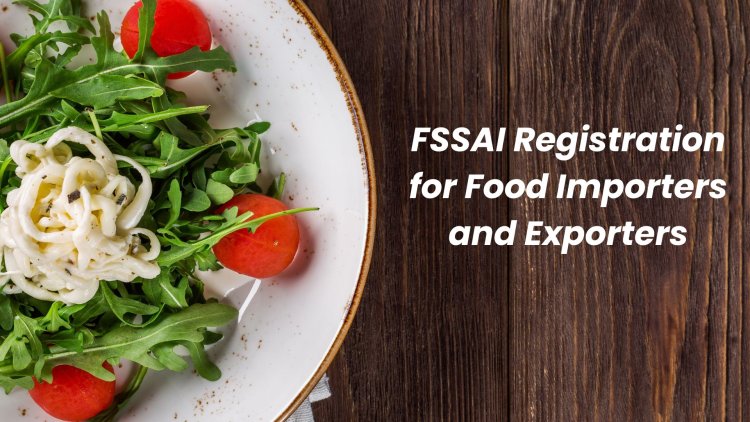FSSAI Registration for Food Importers and Exporters
FSSAI is a key action for maintaining food quality, legal conformity, and global business. For businesses involved in the import or export of products
Share this Post to earn Money ( Upto ₹100 per 1000 Views )

The meaning of food importers and exporters is that they are doing trade with food products like vegetables, fruits, spices, nut varieties, etc. India is a major country in the export market. The food products which are exported from India should maintain high quality and standards, especially for food products.
Importing the food products from other countries also maintains good quality. Not everyone is accepting of the importing of lower-quality products. So, the importing and exporting companies are all following the rules and regulations of the FSSAI Registration.
The importance of FSSAI registration for importers and exporters:
FSSAI, the Food Safety and Standards Authority of India (FSSAI), was introduced by the Indian government. This acts under the Ministry of Health and Family Welfare. The duty of FSSAI is to regulate and supervise the safety of products in India. If you start any food business in India, it is mandatory to register with the FSSAI.
The FSSAI contains food repairing, handling, distributing, retailing, importing and exporting entities. In case the registration fails in the process of registration, that firm faces consequences such as being debarred and charged penalties, so it is mandatory to register the FSSAI.
Coming to the importing and exporting business, holders are mandatory to register the FSSAI before starting their business. The FSSAI is always encouraging the importing and exporting of only high-quality products, so it should be maintaining the quality in business; in case of importing and exporting low-quality products, the consumers are facing health issues. And also, it helps the company or firm face any legal requirements as per the Food Safety Act.
-
The FSSAI is not only to legalise your business; it also helps to expand the business.
-
To build the repudiated company to follow the rules and regulations of FSSAI.
-
The legal process of the FSSAI registration makes your business easy and effective.
-
You can easily expand your trade business to other countries without facing any issues.
-
And also, to build trust and relationship through the FSSAI logo.
-
And also accessing the loans from banks and NBFs through the FSSAI licence.
How to obtain an FSSAI licence for food import and export traders:
FASSI offers three kinds of food licence certificates; you must apply based on your business scale:
-
Basic FSSAI Registration/FSSAI certificate: For annual turnover below 12 lakhs.
-
State FSSAI Food license registration/FSSAI certificate: the annual turnover is 12 lakhs to 20 crores.
-
Central FSSAI Food License Registration/FSSAI certificate: The annual turnover above 20 crore.
Procedure to register the FSSAI certificate for food importers and exporters:
-
Prepare your business plan.
-
Calculate your yearly revenue.
-
Assess the type of licence necessary for operating your food import-export business.
-
Submit the application along with all necessary paperwork.
-
Paying the fee.
-
Send the application.
-
Verify your application is correct, as FSSAI may annul registration for incorrect information. Required modifications should be made and resubmitted within the 30 days.
-
FSSAI may take 15 to 45 days to approve the licence. It's important to follow up consistently and address any discrepancies.
Conclusion:
FSSAI is a key action for maintaining food quality, legal conformity, and global business. For businesses involved in the import or export of products, getting the proper FSSAI licence is not just a legal requirement but also an important consideration in maintaining quality and consumer trust. By following the food safety standards set by FSSAI, businesses can run smoothly in the global food market while confirming that their products meet both national and international safety criteria. It is essential to closely follow the application process, to monitor the updates, and to confirm timely renewal of the registration to ensure smooth business operations.

 Online Services
Online Services 













